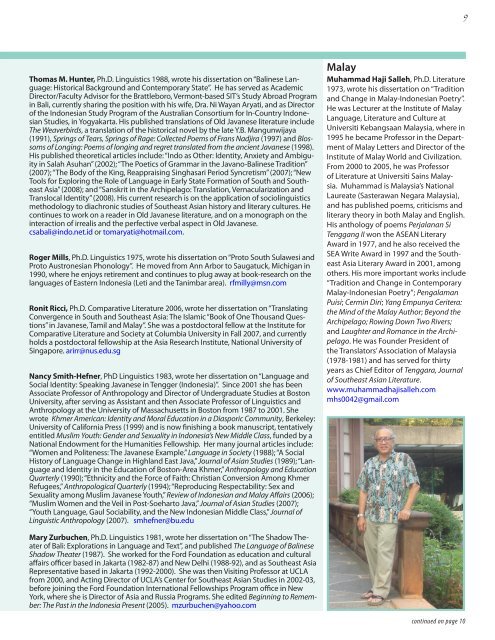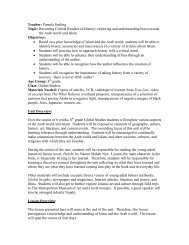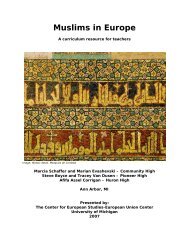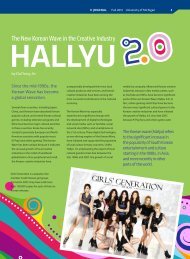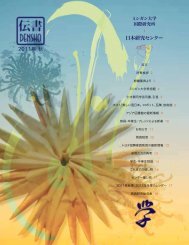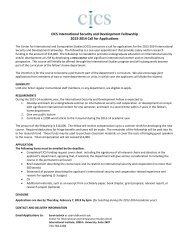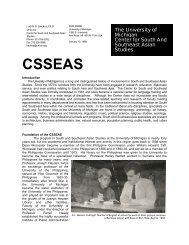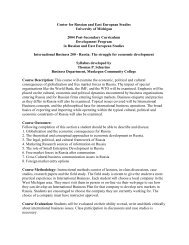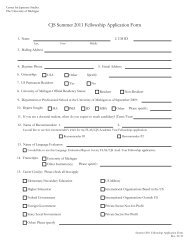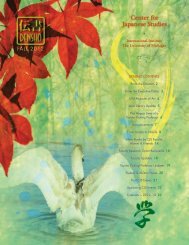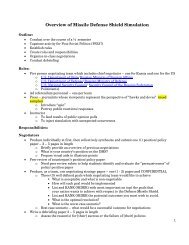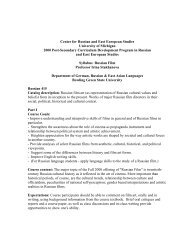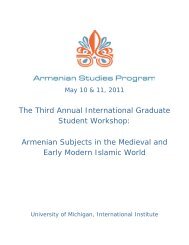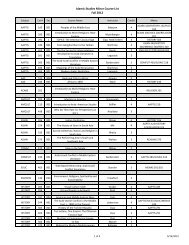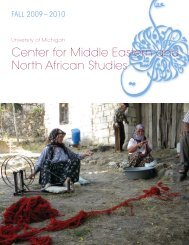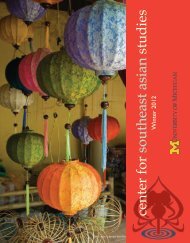Winter 2008 Newsletter - International Institute - University of Michigan
Winter 2008 Newsletter - International Institute - University of Michigan
Winter 2008 Newsletter - International Institute - University of Michigan
Create successful ePaper yourself
Turn your PDF publications into a flip-book with our unique Google optimized e-Paper software.
9<br />
Thomas M. Hunter, Ph.D. Linguistics 1988, wrote his dissertation on “Balinese Language:<br />
Historical Background and Contemporary State”. He has served as Academic<br />
Director/Faculty Advisor for the Brattleboro, Vermont-based SIT’s Study Abroad Program<br />
in Bali, currently sharing the position with his wife, Dra. Ni Wayan Aryati, and as Director<br />
<strong>of</strong> the Indonesian Study Program <strong>of</strong> the Australian Consortium for In-Country Indonesian<br />
Studies, in Yogyakarta. His published translations <strong>of</strong> Old Javanese literature include<br />
The Weaverbirds, a translation <strong>of</strong> the historical novel by the late Y.B. Mangunwijaya<br />
(1991), Springs <strong>of</strong> Tears, Springs <strong>of</strong> Rage: Collected Poems <strong>of</strong> Frans Nadjira (1997) and Blossoms<br />
<strong>of</strong> Longing: Poems <strong>of</strong> longing and regret translated from the ancient Javanese (1998).<br />
His published theoretical articles include: “Indo as Other: Identity, Anxiety and Ambiguity<br />
in Salah Asuhan” (2002); “The Poetics <strong>of</strong> Grammar in the Javano-Balinese Tradition”<br />
(2007); “The Body <strong>of</strong> the King, Reappraising Singhasari Period Syncretism” (2007); “New<br />
Tools for Exploring the Role <strong>of</strong> Language in Early State Formation <strong>of</strong> South and Southeast<br />
Asia” (<strong>2008</strong>); and “Sanskrit in the Archipelago: Translation, Vernacularization and<br />
Translocal Identity” (<strong>2008</strong>). His current research is on the application <strong>of</strong> sociolinguistics<br />
methodology to diachronic studies <strong>of</strong> Southeast Asian history and literary cultures. He<br />
continues to work on a reader in Old Javanese literature, and on a monograph on the<br />
interaction <strong>of</strong> irrealis and the perfective verbal aspect in Old Javanese.<br />
csabali@indo.net.id or tomaryati@hotmail.com.<br />
Roger Mills, Ph.D. Linguistics 1975, wrote his dissertation on “Proto South Sulawesi and<br />
Proto Austronesian Phonology”. He moved from Ann Arbor to Saugatuck, <strong>Michigan</strong> in<br />
1990, where he enjoys retirement and continues to plug away at book-research on the<br />
languages <strong>of</strong> Eastern Indonesia (Leti and the Tanimbar area). rfmilly@msn.com<br />
Ronit Ricci, Ph.D. Comparative Literature 2006, wrote her dissertation on “Translating<br />
Convergence in South and Southeast Asia: The Islamic “Book <strong>of</strong> One Thousand Questions”<br />
in Javanese, Tamil and Malay”. She was a postdoctoral fellow at the <strong>Institute</strong> for<br />
Comparative Literature and Society at Columbia <strong>University</strong> in Fall 2007, and currently<br />
holds a postdoctoral fellowship at the Asia Research <strong>Institute</strong>, National <strong>University</strong> <strong>of</strong><br />
Singapore. arirr@nus.edu.sg<br />
Nancy Smith-Hefner, PhD Linguistics 1983, wrote her dissertation on “Language and<br />
Social Identity: Speaking Javanese in Tengger (Indonesia)”. Since 2001 she has been<br />
Associate Pr<strong>of</strong>essor <strong>of</strong> Anthropology and Director <strong>of</strong> Undergraduate Studies at Boston<br />
<strong>University</strong>, after serving as Assistant and then Associate Pr<strong>of</strong>essor <strong>of</strong> Linguistics and<br />
Anthropology at the <strong>University</strong> <strong>of</strong> Massachusetts in Boston from 1987 to 2001. She<br />
wrote Khmer American: Identity and Moral Education in a Diasporic Community, Berkeley:<br />
<strong>University</strong> <strong>of</strong> California Press (1999) and is now finishing a book manuscript, tentatively<br />
entitled Muslim Youth: Gender and Sexuality in Indonesia’s New Middle Class, funded by a<br />
National Endowment for the Humanities Fellowship. Her many journal articles include:<br />
“Women and Politeness: The Javanese Example.” Language in Society (1988); “A Social<br />
History <strong>of</strong> Language Change in Highland East Java,” Journal <strong>of</strong> Asian Studies (1989); “Language<br />
and Identity in the Education <strong>of</strong> Boston-Area Khmer,” Anthropology and Education<br />
Quarterly (1990); “Ethnicity and the Force <strong>of</strong> Faith: Christian Conversion Among Khmer<br />
Refugees,” Anthropological Quarterly (1994); “Reproducing Respectability: Sex and<br />
Sexuality among Muslim Javanese Youth,” Review <strong>of</strong> Indonesian and Malay Affairs (2006);<br />
“Muslim Women and the Veil in Post-Soeharto Java,” Journal <strong>of</strong> Asian Studies (2007);<br />
“Youth Language, Gaul Sociability, and the New Indonesian Middle Class,” Journal <strong>of</strong><br />
Linguistic Anthropology (2007). smhefner@bu.edu<br />
Malay<br />
Muhammad Haji Salleh, Ph.D. Literature<br />
1973, wrote his dissertation on “Tradition<br />
and Change in Malay-Indonesian Poetry”.<br />
He was Lecturer at the <strong>Institute</strong> <strong>of</strong> Malay<br />
Language, Literature and Culture at<br />
Universiti Kebangsaan Malaysia, where in<br />
1995 he became Pr<strong>of</strong>essor in the Department<br />
<strong>of</strong> Malay Letters and Director <strong>of</strong> the<br />
<strong>Institute</strong> <strong>of</strong> Malay World and Civilization.<br />
From 2000 to 2005, he was Pr<strong>of</strong>essor<br />
<strong>of</strong> Literature at Universiti Sains Malaysia.<br />
Muhammad is Malaysia’s National<br />
Laureate (Sasterawan Negara Malaysia),<br />
and has published poems, criticisms and<br />
literary theory in both Malay and English.<br />
His anthology <strong>of</strong> poems Perjalanan Si<br />
Tenggang II won the ASEAN Literary<br />
Award in 1977, and he also received the<br />
SEA Write Award in 1997 and the Southeast<br />
Asia Literary Award in 2001, among<br />
others. His more important works include<br />
“Tradition and Change in Contemporary<br />
Malay-Indonesian Poetry”; Pengalaman<br />
Puisi; Cermin Diri; Yang Empunya Ceritera:<br />
the Mind <strong>of</strong> the Malay Author; Beyond the<br />
Archipelago; Rowing Down Two Rivers;<br />
and Laughter and Romance in the Archipelago.<br />
He was Founder President <strong>of</strong><br />
the Translators’ Association <strong>of</strong> Malaysia<br />
(1978-1981) and has served for thirty<br />
years as Chief Editor <strong>of</strong> Tenggara, Journal<br />
<strong>of</strong> Southeast Asian Literature.<br />
www.muhammadhajisalleh.com<br />
mhs0042@gmail.com<br />
Mary Zurbuchen, Ph.D. Linguistics 1981, wrote her dissertation on “The Shadow Theater<br />
<strong>of</strong> Bali: Explorations in Language and Text”, and published The Language <strong>of</strong> Balinese<br />
Shadow Theater (1987). She worked for the Ford Foundation as education and cultural<br />
affairs <strong>of</strong>ficer based in Jakarta (1982-87) and New Delhi (1988-92), and as Southeast Asia<br />
Representative based in Jakarta (1992-2000). She was then Visiting Pr<strong>of</strong>essor at UCLA<br />
from 2000, and Acting Director <strong>of</strong> UCLA’s Center for Southeast Asian Studies in 2002-03,<br />
before joining the Ford Foundation <strong>International</strong> Fellowships Program <strong>of</strong>fice in New<br />
York, where she is Director <strong>of</strong> Asia and Russia Programs. She edited Beginning to Remember:<br />
The Past in the Indonesia Present (2005). mzurbuchen@yahoo.com<br />
continued on page 10


